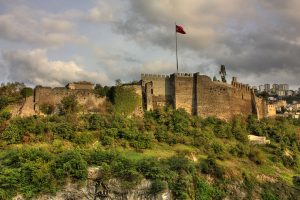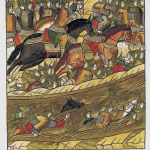The Towers of Trebizond is a novel by mid-century British author Rose Macaulay in which Ms. Macaulay takes on many of her favorite subjects — travel, ancient lands, British social customs, the role of women, and the like. She also drops hints along the way about the writing biz, religion, and the geopolitical climate in the Near East in the mid 1950s.
_+_
When you first begin to read Rose Macaulay’s The Towers of Trebizond, you are beset with questions. What sort of book is this? Is it a travelogue? A romance? A critique of religion? A send up of British travelers, of the British generally, of global politics in the post-War era? As the saying goes, if you have to ask…
Moreover, Macaulay is so careless of her format that she eventually takes her plot out of plausibility altogether and wanders off into metafiction. Is it a novel, a memoir, a meta-memoir…? And if the answer is ‘all of the above,’ how does one go about evaluating it? It’s a story that resists being summarized. So while there’s much to be said about it, the only way to get at all that richness of thought and experience (and sarcasm and ennui) is to read the book. But though you’re reading this review, that doesn’t mean you’re going to read the book. This article may be the closest you ever get to The Towers of Trebizond. So I will endeavor to give you enough of its flavor to make you feel as though you might have read it, which is probably good enough…
Rose, I mean Laurel, for that is her name in the book, is traveling with her Aunt Dot, an inveterate world traveler on other people’s dimes, along with a very high Anglican priest by the name of Father Chantry-Pigg, and a camel, upon which Aunt Dot and sometimes Father Chantry-Pigg ride in their circumlocutions around the Black Sea after having left Istanbul, formerly Constantinople. It matters what Istanbul used to be called because all the members of this party are very interested in ancient ruins. They’re more likely to know what something was called in the time of Christ than in 1955 when these travels took place. This of course causes some confusion on the part of locals who don’t regard their villages as ancient ruins.
The other preoccupation of this band of travelers is converting Muslims, especially Muslim women, to Anglicanism. This angle is very much exploited for its rich comic potential, as each Sunday, Father Chantry-Pigg sets up his altar in the village square and says high mass to a small cluster of skeptical villagers while everyone else scurries off to their various abodes to avoid the contagion of the infidel. Or something along those lines. I won’t be giving too much away if I divulge that these efforts are not even remotely successful.
Laurel helps out with the proselytizing from time to time, handing out religious pamphlets if it looks as though it will help a given situation. Otherwise, she seems very much along for the ride, and not only on the camel. Normally, she lives in London, the beneficiary of her fabulously wealthy mother’s casual largesse. She is also having an affair with a married man who goes by the sexy, foreign-sounding name of Vere. But Laurel is oddly religious despite being a modern, and Vere, for his part, is not showing signs of impending divorce. Laurel feels guilty but can’t bring herself to leave him, so she runs away to hide, which is what she’s doing when we catch up to her in Turkey with her aunt. And she does it pretty well, this hiding out, because the famous Vere doesn’t show up until the very end of the book and what an end it is. But for obvious reasons, we won’t get into that.
In between, there are various meditations on history, colonialism, empires, the ends of empires, magic, food, language, friendship, intellectual theft, and more. But obviously you can’t build a plot around random meditations, so three quarters of the way through the novel, Aunt Dot and Father Chantry-Pigg sneak into Russia where they are lost to civilization for many weeks to the consternation of their friends.
Truly, it is that kind of novel, if in fact there is another of “that kind” to compare it to.
One side-effect of reading The Towers of Trebizond is that you get an inkling of what educated Britishers were thinking about the Middle East, Central Asia, and Russia at the time. If there is one word that sums it up, it would be distrust. On both sides. As for Laurel, she would rather be in Trebizond in the days of the Patriarchs of the Byzantine Empire. It is there that she does her deepest musing. But her visit to Israel brings out a still deeper note:
“Jerusalem is a cruel, haunted city, “ she writes, “like all ancient cities; it stands out because it crucified Christ; and because it was Christ we remember it with horror, but it also crucified thousands of other people, or wherever Rome (or indeed any one else) rules, these ghastly deaths and torturings were enjoyed by all, that is, by all except the victims and those who loved them, and it is these, the crucifixions and the flayings and the burnings and the tearing to pieces and the flogging and the blindings and the throwing to the wild beasts, all the horrors of great pain that people thought out and enjoyed which make history a dark pit full of serpents and terror, and out of this pit we were all dug, our roots deep in it, and still it goes on, though all the time gradually less. And out of this ghastliness of cruelty and pain in Jerusalem on what we call Good Friday there sprang this Church that we have [Christianity], and it inherited all that cruelty, which went on fighting against the love and goodness which it inherited too, and they are still fighting, but sometimes it seems a losing battle for the love and goodness, though they never quite go under and never can.”
Macaulay tends toward long sentences as a rule but the ones here approach Proustian proportions. Yet it is this seemingly unending litany of pain and cruelty that slams home her point, that these ancient lands with their historic ruins and deep roots are not special really — they just have more pain in their much longer histories, more blood in their soil, than other less antiquated locales. Meanwhile, the cruelty that people inherited in the course of history was not a function of their predecessors but of human nature itself. This is a dark realization to have at the end of a light, amusing travelogue featuring a dotty maiden aunt and an increasingly deranged camel.
The Towers of Trebizond is not a story with a happy ending. Laurel pays dearly for her crime, although it isn’t adultery that gets her, but herself and her all too human nature. Meanwhile, everything else is now ruined, or so we’re told, “spoilt,” from England to the Adriatic and all points in between. Which is how, it turns out, we came to be in Trebizond in the first place.





